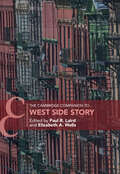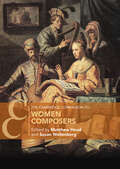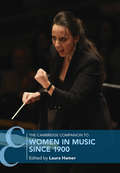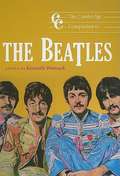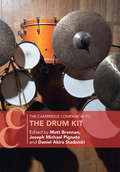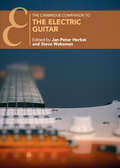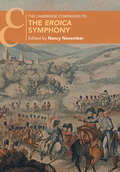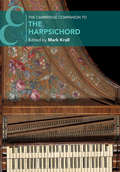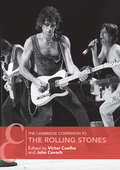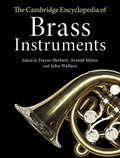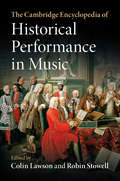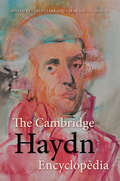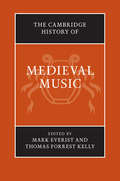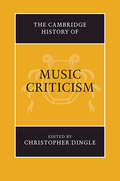- Table View
- List View
The Cambridge Companion to West Side Story (Cambridge Companions to Music)
by Paul R. Laird Elizabeth A. WellsOver sixty years after its opening night, West Side Story is perhaps the most famous and beloved of twentieth-century musicals and stands as a colossus of musical and dramatic achievement. It not only helped define a generation of musical theatre lovers but is among the handful of shows that have contributed to our understanding of American musical identity at mid-century. Bringing together contemporary scholars in music, theatre, dance, literature, and performance, this Companion explores this explosive 1950s remake of Shakespeare's Romeo and Juliet and its portrayal of the raw passion, rivalries, jealousy and rage that doom the young lovers to their tragic fate. Organised thematically, chapters range from Broadway's history and precursors to West Side Story; the early careers of its creators; the show's score with emphasis on writing, production, and orchestrations; issues of class, colourism, and racism; New York's gang culture, and how the show's legacy can be found in popular culture throughout the world.
The Cambridge Companion to Women Composers (Cambridge Companions to Music)
by Matthew Head Susan WollenbergMoving beyond narratives of female suppression, and exploring the critical potential of a diverse, distinguished repertoire, this Companion transforms received understanding of women composers. Organised thematically, and ranging beyond elite, Western genres, it explores the work of diverse female composers from medieval to modern times, besides the familiar headline names. The book's prologue traces the development of scholarship on women composers over the past five decades and the category of 'woman composer' itself. The chapters that follow reveal scenes of flourishing creativity, technical innovation, and (often fleeting) recognition, challenging long-held notions around invisibility and neglect and dismissing clichés about women composers and their work. Leading scholars trace shifting ideas about composers and compositional processes, contributing to a wider understanding of how composers have functioned in history and making this volume essential reading for all students of musical history. In an epilogue, three contemporary composers reflect on their careers and identities.
The Cambridge Companion to Women in Music since 1900 (Cambridge Companions to Music)
by Laura HamerThis Companion explores women's work in music since 1900 across a broad range of musical genres and professions, including the classical tradition, popular music, and music technology. The crucial contribution of women to music education and the music industries features alongside their activity as composers and performers. The book considers the gendered nature of the musical profession, in areas including access to training, gendered criticism, sexualization, and notions of 'gender appropriate' roles or instruments. It covers a wide range of women musicians, such as Marin Alsop, Grace Williams, Billie Holiday, Joni Mitchell and Adele. Each thematic section concludes with a contribution from a practitioner in her own words, reflecting upon the impact of gender on her own career. Chapters include suggestions for further reading on each of the topics covered, providing an invaluable resource for students of Feminist Musicology, Women in Music, and Music and Gender.
The Cambridge Companion to the Beatles
by Kenneth WomackFrom Please Please Me to Abbey Road, this collection of essays tells the fascinating story of the Beatles - the creation of the band, their musical influences, and their cultural significance, with emphasis on their genesis and practices as musicians, songwriters, and recording artists. Through detailed biographical and album analyses, the book uncovers the background of each band member and provides expansive readings of the band's music. - Traces the group's creative output from their earliest recordings through their career - Pays particular attention to the social and historical factors which contributed to the creation of the band - Investigates the Beatles' unique enduring musical legacy and cultural power - Clearly organized into three sections, covering Background, Works, and History and Influence, the Companion is ideal for course usage, and is also a must-read for all Beatles fans
The Cambridge Companion to the Cello
by Robin StowellThis is a compact, composite and authoritative survey of the history and development of the cello and its repertory since the origins of the instrument. The volume comprises thirteen essays, written by a team of nine distinguished scholars and performers, and is intended to develop the cello's historical perspective in breadth and from every relevant angle, offering as comprehensive a coverage as possible. It focuses in particular on four principal areas: the instrument's structure, development and fundamental acoustical principles; the careers of the most distinguished cellists since the baroque era; the cello repertory (including chapters devoted to the concerto, the sonata, other solo repertory, and ensemble music); and its technique, teaching methods and relevant aspects of historical and performance practice. It is the most comprehensive book ever to be published about the instrument and provides essential information for performers, students and teachers.
The Cambridge Companion to the Clarinet
by Colin LawsonThe Cambridge Companion to the Clarinet is a practical guide to the world of the clarinet. It offers students and performers a composite survey of the history and repertoire of the instrument from its origins to the present day, as well as practical guidance on teaching and performing. Special focus is made on the various members of the extensive clarinet family and specialist chapters provide advice on the mechanics of clarinet playing, the art of historical performance, contemporary techniques, and the clarinet in jazz. A chapter on the professional clarinettist introduces the world of the performing musician, while a survey of the clarinet on record provides the listener with a useful guide to the recording history of the instrument. Informed by the experience of distinguished performers and teachers, this book makes an essential and stimulating reference book for all clarinet enthusiasts.
The Cambridge Companion to the Concerto
by Simon P. KeefeNo musical genre has had a more controversial critical history than the concerto, but has simultaneously retained as consistently prominent a place in the affections of the concert-going public. This volume is one of a very few to deal with the genre in its entirety. Setting the concerto in its musical and non-musical contexts, it examines the concertos that have made important contributions to musical culture, and reviews performance-related topics.
The Cambridge Companion to the Drum Kit (Cambridge Companions to Music)
by Matt Brennan Joseph Michael Pignato Daniel Akira StadnickiThe drum kit is ubiquitous in global popular music and culture, and modern kit drumming profoundly defined the sound of twentieth-century popular music. The Cambridge Companion to the Drum Kit highlights emerging scholarship on the drum kit, drummers and key debates related to the instrument and its players. Interdisciplinary in scope, this volume draws on research from across the humanities, sciences, and social sciences to showcase the drum kit, a relatively recent historical phenomenon, as a site worthy of analysis, critique, and reflection. Providing readers with an array of perspectives on the social, material, and performative dimensions of the instrument, this book will be a valuable resource for students, drum kit studies scholars, and all those who want a deeper understanding of the drum kit, drummers, and drumming.
The Cambridge Companion to the Electric Guitar (Cambridge Companions to Music)
by Steve Waksman Jan-Peter HerbstThe electric guitar is one of the most important musical instruments and cultural artifacts of the 20th and 21st centuries and enjoys popularity worldwide. Designed for students, this Companion explores electric guitar technology and performance, and the instrument's history and cultural impact. Chapters focused on the social significance of the electric guitar draw attention to the ways in which gender and race have shaped and been shaped by it, the ecology of electric guitar manufacturing, and the participation of electric guitarists in online communities. Contributions on electric guitar history stretch the chronology backwards in time and broaden our ideas of what belongs in that history, and those addressing musical style investigate the cultural value of virtuosity while providing material analysis of electric guitar technique. The Companion's final section considers the electric guitar's global circulation, particularly in Africa, the Afro-Caribbean, and Southeast Asia.
The Cambridge Companion to the Eroica Symphony (Cambridge Companions to Music)
by Nancy NovemberThis Companion provides orientation for those embarking on the study of Beethoven's much-discussed Eroica Symphony, as well as providing fresh insights that will appeal to scholars, performers and listeners more generally. The book addresses the symphony in three thematic sections, on genesis, analysis and reception history, and covers key topics including political context, dedication, sources of the Symphony's inspiration, 'heroism' and the idea of a 'watershed' work. Critical studies of writings and analyses from Beethoven's day to ours are included, as well as a range of other relevant responses to the work, including compositions, recordings, images and film. The Companion draws on previous literature but also illuminates the work from new angles, based on new evidence and a range of approaches by twelve leading scholars in Beethoven research.
The Cambridge Companion to the Harpsichord (Cambridge Companions to Music)
by Mark KrollWritten by fourteen leading experts in the field, this Companion covers almost every aspect of the harpsichord - the history of the instrument, tuning systems, the role of the harpsichord in ensemble, its use in the twentieth and twenty-first centuries, and includes separate chapters devoted to Domenico Scarlatti, J. S. Bach and Handel. Chapters featuring almost every national style are written by authors with close connections to the countries about which they are writing, including England, The Netherlands, Germany, the Austro-Hungarian Empire, France, Italy, Portugal and Spain, as well as the less extensive harpsichord traditions of Russia, the Nordic and Baltic countries, and colonial Spanish and Portuguese America. With musical examples, illustrations, a timeline of the harpsichord, and an appendix of composers, reliable editions and original sources, this book is for all who love the harpsichord, or want to learn more about it.
The Cambridge Companion to the Lied
by James ParsonsBeginning several generations before Schubert, the Lied first appears as domestic entertainment. In the century that follows it becomes one of the primary modes of music-making. By the time German song comes to its presumed conclusion with Richard Strauss's 1948 Vier letzte Lieder, this rich repertoire has moved beyond the home and keyboard accompaniment to the symphony hall. This is a 2004 introductory chronicle of this fascinating genre. In essays by eminent scholars, this Companion places the Lied in its full context - at once musical, literary, and cultural - with chapters devoted to focal composers as well as important issues, such as the way in which the Lied influenced other musical genres, its use as a musical commodity, and issues of performance. The volume is framed by a detailed chronology of German music and poetry from the late 1730s to the present and also contains a comprehensive bibliography.
The Cambridge Companion to the Orchestra
by Colin LawsonThis guide to the orchestra and orchestral life combines orchestral repertory history with critical thought. It includes topics such as the art of orchestration, scorereading, conducting, international orchestras, recording, and becoming an orchestral musician, educator or informed listener.
The Cambridge Companion to the Organ
by Nicholas Thistlethwaite Geoffrey WebberThis Companion is an essential guide to all aspects of the organ and its music. It examines in turn the instrument, the player and the repertoire. The early chapters tell of the instrument's history and construction, identify the scientific basis of its sounds and the development of its pitch and tuning, examine the history of the organ case, and consider the current trends and conflicts within the world of organ building. Central chapters investigate the practical art of learning and playing the organ, introduce the complex area of performance practice, and outline the relationship between organ playing and the liturgy of the church. The final section explores the vast repertoire of organ music, focusing on a selection of the most important traditions.
The Cambridge Companion to the Piano
by David RowlandThe Cambridge Companion to the Piano is an informative and practical guide to one of the world's most popular instruments. This collection of specially commissioned essays offers an accessible introduction to the history of the piano, performance styles, and its vast repertoire. Part 1 reviews the evolution of the piano, from its earliest forms up to the most recent developments. Part 2 explores the varied repertory, up to contemporary music, with a final chapter on jazz, blues and ragtime. The Companion also contains a glossary of important terms and will be a valuable source for the piano performer, student and enthusiast.
The Cambridge Companion to the Rolling Stones (Cambridge Companions to Music)
by John Covach Victor CoelhoThe Rolling Stones are one of the most influential, prolific, and enduring Rock and Roll bands in the history of music. This groundbreaking, specifically commissioned collection of essays provides the first dedicated academic overview of the music, career, influences, history, and cultural impact of the Rolling Stones. Shining a light on the many communities and sources of knowledge about the group, this Companion brings together essays by musicologists, ethnomusicologists, players, film scholars, and filmmakers into a single volume intended to stimulate fresh thinking about the group as they vault well over the mid-century of their career. Threaded throughout these essays are album- and song-oriented discussions of the landmark recordings of the group and their influence. Exploring new issues about sound, culture, media representation, the influence of world music, fan communities, group personnel, and the importance of their revival post-1989, this collection greatly expands our understanding of their music.
The Cambridge Companion to the Saxophone
by Richard InghamThis is the first comprehensive guide to the saxophone, its history, technical development and repertoire. Extensively researched and including much new information, the volume is written by some of the finest performers and experts on the instrument. The Cambridge Companion to the Saxophone incorporates detailed historical developments in the classical, jazz and rock fields, provides practical performance guides, and has a chapter on teaching the instrument.
The Cambridge Companion to the String Quartet
by Robin StowellWill enrich readers' understanding of the history of the string quartet, the music and its interpretation.
The Cambridge Companion to the Violin
by Robin StowellThe Cambridge Companion to the Violin offers students, performers, and scholars a fascinating and composite survey of the history and repertory of the instrument from its origins to the present day. The volume comprises fifteen essays, written by a team of specialists, and is intended to develop the violin's historical perspective in breadth and from every relevant angle. The principal subjects discussed include the instrument's structure and development; its fundamental acoustical properties; principal exponents; technique and teaching principles; solo and ensemble repertory; pedagogical literature; traditions in folk music and jazz; and aspects of historical performing practice. The text is supported by numerous illustrations and diagrams as well as music examples, a useful appendix, glossary of technical terms, and an extensive bibliography.
The Cambridge Encyclopedia of Brass Instruments
by Trevor Herbert John Wallace Arnold MyersSome thirty-two experts from fifteen countries join three of the world's leading authorities on the design, manufacture, performance and history of brass musical instruments in this first major encyclopaedia on the subject. It includes over one hundred illustrations, and gives attention to every brass instrument which has been regularly used, with information about the way they are played, the uses to which they have been put, and the importance they have had in classical music, sacred rituals, popular music, jazz, brass bands and the bands of the military. There are specialist entries covering every inhabited region of the globe and essays on the methods that experts have used to study and understand brass instruments. The encyclopaedia spans the entire period from antiquity to modern times, with new and unfamiliar material that takes advantage of the latest research. From Abblasen to Zorsi Trombetta da Modon, this is the definitive guide for students, academics, musicians and music lovers.
The Cambridge Encyclopedia of Historical Performance in Music
by Robin Stowell Colin LawsonRecent decades have seen a major increase of interest in historical performance practice, but until now there has been no comprehensive reference tool available on the subject. This fully up-to-date, illuminating and accessible volume will assist readers in rediscovering and recreating as closely as possible how musical works may originally have sounded. Focusing on performance, this Encyclopedia contains entries in categories including issues of style, techniques and practices, the history and development of musical instruments, and the work of performers, scholars, theorists, composers and editors. It features contributions from more than 100 leading experts who provide a geographically varied survey of both theory and practice, as well as evaluation of and opinions on the resolution of problems in period performance. This timely and ground breaking book will be an essential resource for students, scholars, teachers, performers and audiences.
The Cambridge Haydn Encyclopedia
by Caryl Clark Sarah Day-O'ConnellFor well over two hundred years, Joseph Haydn has been by turns lionized and misrepresented - held up as celebrity, and disparaged as mere forerunner or point of comparison. And yet, unlike many other canonic composers, his music has remained a fixture in the repertoire from his day until ours. What do we need to know now in order to understand Haydn and his music? With over eighty entries focused on ideas and seven longer thematic essays to bring these together, this distinctive and richly illustrated encyclopedia offers a new perspective on Haydn and the many cultural contexts in which he worked and left his indelible mark during the Enlightenment and beyond. Contributions from sixty-seven scholars and performers in Europe, the Americas, and Oceania, capture the vitality of Haydn studies today - its variety of perspectives and methods - and ultimately inspire further exploration of one of western music's most innovative and influential composers.
The Cambridge History of Medieval Music (The Cambridge History of Music)
by Mark Everist Thomas Forrest KellySpanning a millennium of musical history, this monumental volume brings together nearly forty leading authorities to survey the music of Western Europe in the Middle Ages. All of the major aspects of medieval music are considered, making use of the latest research and thinking to discuss everything from the earliest genres of chant, through the music of the liturgy, to the riches of the vernacular song of the trouvères and troubadours. Alongside this account of the core repertory of monophony, The Cambridge History of Medieval Music tells the story of the birth of polyphonic music, and studies the genres of organum, conductus, motet and polyphonic song. Key composers of the period are introduced, such as Leoninus, Perotinus, Adam de la Halle, Philippe de Vitry and Guillaume de Machaut, and other chapters examine topics ranging from musical theory and performance to institutions, culture and collections.
The Cambridge History of Music Criticism (The Cambridge History of Music)
by Christopher DingleMusic criticism has played a fundamental and influential role throughout music history, with numerous composers such as Berlioz, Schumann, and Wagner, as well as many contemporary musicians, also maintaining careers as writers and critics. The Cambridge History of Music Criticism goes beyond these better-known accounts, reaching back to medieval times, expanding the geographical reach both within and beyond Europe, and including key issues such as women and criticism of recordings, as well as the story of criticism in jazz, popular music and world music. Drawing on a blend of established and talented young scholars, this is the first substantial historical survey of music criticism and critics, bringing unprecedented scope to a rapidly expanding area of musicological research. An indispensable point of reference, The Cambridge History of Music Criticism provides a broad historical overview of the field while also addressing specific issues and events.
The Cambridge History of Musical Performance
by Robin Stowell Colin LawsonThe intricacies and challenges of musical performance have recently attracted the attention of writers and scholars to a greater extent than ever before. Research into the performer's experience has begun to explore such areas as practice techniques, performance anxiety and memorisation, as well as many other professional issues. Historical performance practice has been the subject of lively debate way beyond academic circles, mirroring its high profile in the recording studio and the concert hall. Reflecting the strong ongoing interest in the role of performers and performance, this History brings together research from leading scholars and historians and, importantly, features contributions from accomplished performers, whose practical experiences give the volume a unique vitality. Moving the focus away from the composers and onto the musicians responsible for bringing the music to life, this History presents a fresh, integrated and innovative perspective on performance history and practice, from the earliest times to today.
